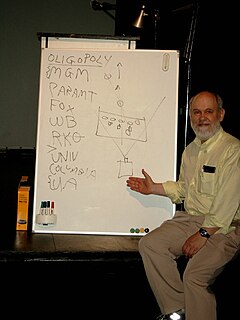
The cinema of Japan has a history that spans more than 100 years. Japan has one of the oldest and largest film industries in the world; as of 2010, it was the fourth largest by number of feature films produced. In 2011 Japan produced 411 feature films that earned 54.9% of a box office total of US$2.338 billion. Films have been produced in Japan since 1897, when the first foreign cameramen arrived.
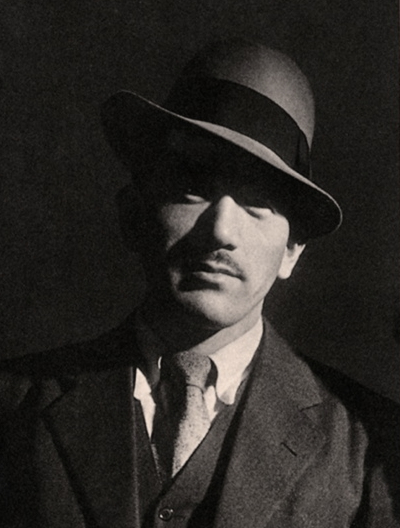
Yasujirō Ozu was a Japanese film director and screenwriter. He began his career during the era of silent films, and his last films were made in color in the early 1960s. Ozu first made a number of short comedies, before turning to more serious themes in the 1930s.

Kogo Noda was a Japanese screenwriter most famous for collaborating with Yasujirō Ozu on many of the director's films.
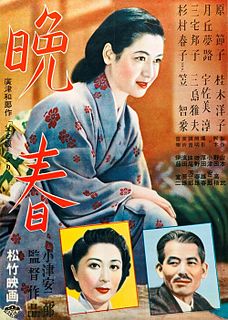
Late Spring is a 1949 Japanese drama film, directed by Yasujirō Ozu and produced by the Shochiku studio. It is based on the short novel Father and Daughter by the 20th-century novelist and critic Kazuo Hirotsu, and was adapted for the screen by Ozu and his frequent collaborator, screenwriter Kogo Noda. The film was written and shot during the Allied Powers' Occupation of Japan and was subject to the Occupation's official censorship requirements. It stars Chishū Ryū, who was featured in almost all of the director’s films, and Setsuko Hara, marking her first of six appearances in Ozu’s work. It is the first installment of Ozu’s so-called “Noriko trilogy”—the others are Early Summer and Tokyo Story —in each of which Hara portrays a young woman named Noriko, though the three Norikos are distinct, unrelated characters, linked primarily by their status as single women in postwar Japan.

Tokyo Story is a 1953 Japanese drama film directed by Yasujirō Ozu and starring Chishū Ryū and Chieko Higashiyama. It tells the story of an aging couple who travel to Tokyo to visit their grown children. The film contrasts the behavior of their children, who are too busy to pay them much attention, with that of their widowed daughter-in-law, who treats them with kindness.
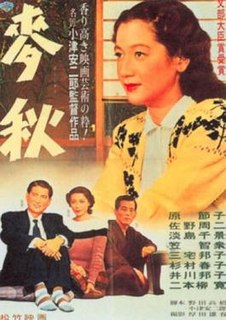
Early Summer is a 1951 film by Yasujirō Ozu. Like most of Ozu's post-war films, Early Summer deals with many issues ranging from communication problems between generations to the rising role of women in post-war Japan.
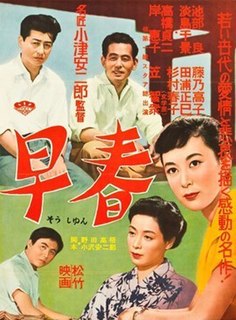
Early Spring is a 1956 film by Yasujirō Ozu about a married salaryman who escapes the monotony of married life and his work at a fire brick manufacturing company by beginning an affair with a fellow office worker. The film also deals with the hardships of the salaryman lifestyle. "I wanted," Ozu said, "to portray what you might call the pathos of the white-collar life."

Setsuko Hara was a Japanese actress. In the West, she is best known for her performances in Yasujirō Ozu's films Late Spring (1949) and Tokyo Story (1953), although she had already appeared in 67 films before working with Ozu.

Donald Richie was an American-born author who wrote about the Japanese people, the culture of Japan, and especially Japanese cinema. Although he considered himself primarily a film historian, Richie also directed a number of experimental films, the first when he was 17.

I Was Born, But... is a 1932 black-and-white Japanese silent film directed by Yasujirō Ozu. It became the first of six Ozu films to win the Kinema Junpo Award for Best Film of the Year. Ozu later loosely remade the film as Good Morning (1959).
Shigehiko Hasumi is a film critic and an academic researcher on French literature from Japan. He was president of the University of Tokyo from 1997 to 2001.

Sword of Penitence is a 1927 Japanese silent film written and directed by Yasujirō Ozu. It is the first film directed by Ozu and was also the first of his many collaborations with screenwriter Kogo Noda. It is a lost film. No script, negative or prints survive.
Yoshishige Yoshida, also known as Kijū Yoshida, is a Japanese film director and screenwriter.
An Inn in Tokyo is a 1935 silent film directed by Yasujirō Ozu. The film is Ozu's last extant silent film.
Woman of Tokyo is a 1933 Japanese film directed by Yasujirō Ozu. The film's working title was Her Case, For Example
Events in the year 1932 in Japan.

Ozu's Anti-Cinema is a 1998 book written by Yoshishige Yoshida, translated into English in 2003, and published by Center for Japanese Studies, University of Michigan. It included analysis and commentary on Yasujirō Ozu's films and film-making techniques.
John Gillett (1925–1995) was a British film critic and researcher whose career at the British Film Institute spanned over 44 years. He was also a programmer for the National Film Theatre on the works of Buster Keaton, early Russian cinema and Japanese cinema, to name a few. He wrote film reviews for The Monthly Film Bulletin. With Ian Christie, he edited Futurism/Formalism/FEKS: 'Eccentrism' and Soviet Cinema 1918-1936. He was also an editor of Yasujiro Ozu: A Critical Anthology, with David Wilson.

I Graduated, But... (大学は出たけれど) is a 1929 Japanese silent film directed by Yasujirō Ozu. The film is now lost, except for an excerpt of approximately 10 minutes.
This page is based on this
Wikipedia article Text is available under the
CC BY-SA 4.0 license; additional terms may apply.
Images, videos and audio are available under their respective licenses.
